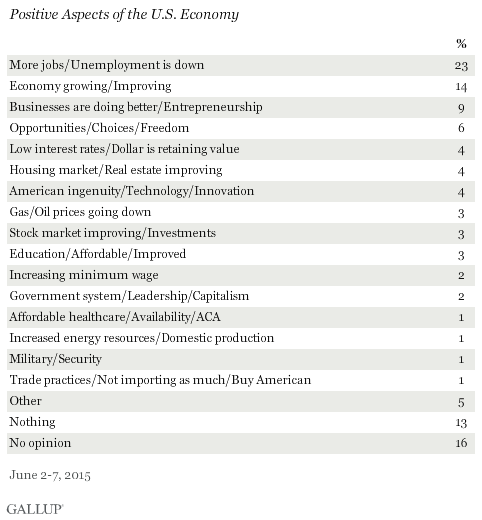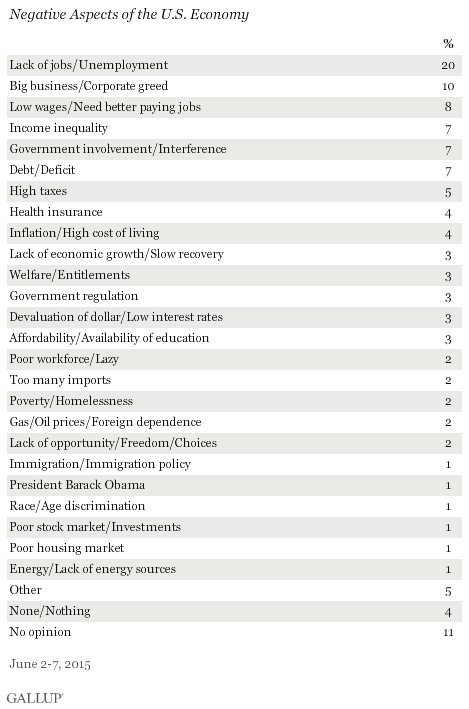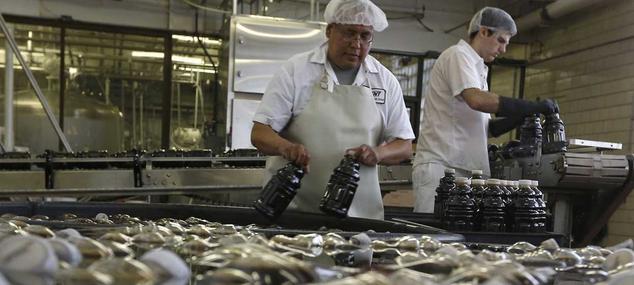Story Highlights
- More jobs, lower unemployment named best aspect of economy
- Lack of jobs, unemployment named worst aspect of economy
- "Economy growing" named positive; "Big business" named negative
WASHINGTON, D.C. -- The current job climate presents a classic glass half-full/half-empty situation for Americans. When asked what the most positive aspect of the economy is, more Americans cite the availability of jobs and decline in unemployment than any other attribute. But when asked to name the most negative aspect of the economy, they most often mention the continued lack of jobs or unemployment.

In an open-ended question in the June 2-7 survey, Gallup asked Americans to name the most positive and negative aspects about the U.S. economy today. Twenty-three percent say "more jobs/unemployment is down," while about half as many mention "economy growing/improving" at 14%, and 9% cite "businesses are doing better/entrepreneurship."
To explain why Americans may be thinking this way, more Americans in general say it is a good time to find a quality job, though a majority still say it is a bad time to find a quality job. Also, Gallup's Job Creation Index reached a new high in April of +31, another indicator that many Americans believe the job market is improving.
Democrats are more likely than Republicans to say jobs are a highlight of the economy -- 33% of Democrats cite it as the most positive aspect, while 20% of Republicans and 17% of independents say the same thing.
Lack of Jobs, Big Business Top List of Negatives
Just as jobs top Americans' list of positives, it also tops the list of negatives about the U.S. economy. In this case, 20% of Americans cite "lack of jobs/unemployment" as the most negative aspect of the economy, double the mentions of "big business/corporate greed" at 10%. "Low wages," "income inequality," "government involvement" and "debt" are not far behind.
Although the U.S. unemployment rate is nearly half of what it was five years ago, and Americans are less likely to name it as the most important problem facing the country, many may still be troubled about the types of jobs that are being created or are available. The sentiment that these jobs are low-paying, with weak benefits, is pervasive among many U.S. thought leaders.

Politically, 24% of Republicans say jobs are the most negative aspect of the economy, while 19% of independents and 18% of Democrats share that sentiment.
In addition to jobs, other aspects of the economy make both lists. Gas prices are seen as both positive and negative, along with the housing market and health insurance. This suggests that these are far from "settled issues" in Americans' views of the economy.
Bottom Line
Jobs topped both positive and negative lists, which not only illustrates how top-of-mind jobs are when Americans think about the health of the economy, but also that the jury is still out on whether the job market has improved enough to be considered a boon to the economy.
Along with gas prices, the housing market and healthcare made both lists. The fact that these aspects made the list as both a positive and a negative underscores how often there is a difference of opinion on many issues in American life, and that there is far from a consensus on whether the economy is progressing. Broadly speaking, with Gallup's Economic Confidence Index near the 0 neutral point on the scale for several months, Americans are pretty evenly divided as to the state of the economy.
Survey Methods
Results for this Gallup poll are based on telephone interviews conducted June 2-7, 2015, on the Gallup U.S. Daily survey, with a random sample of 1,527 adults, aged 18 and older, living in all 50 U.S. states and the District of Columbia. For results based on the total sample of national adults, the margin of sampling error is ±3 percentage points at the 95% confidence level.
Each sample of national adults includes a minimum quota of 50% cellphone respondents and 50% landline respondents, with additional minimum quotas by time zone within region. Landline and cellular telephone numbers are selected using random-digit-dial methods.
View complete question responses and trends.
Learn more about how Gallup Poll Social Series works.

